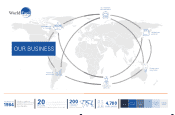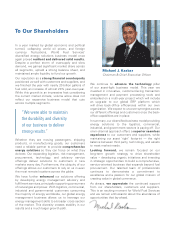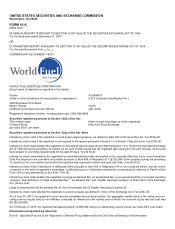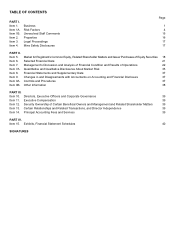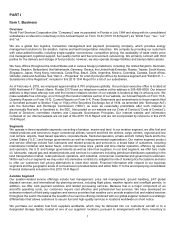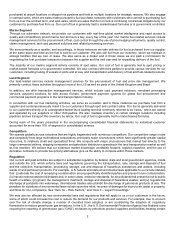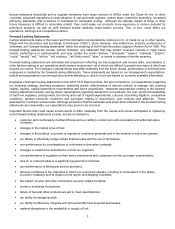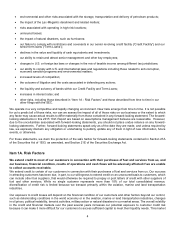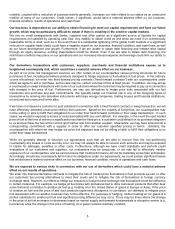World Fuel Services 2015 Annual Report Download - page 7
Download and view the complete annual report
Please find page 7 of the 2015 World Fuel Services annual report below. You can navigate through the pages in the report by either clicking on the pages listed below, or by using the keyword search tool below to find specific information within the annual report.2
purchased at airport locations or shipped via pipelines and held at multiple locations for strategic reasons. We also engage
in contract sales, which are sales made pursuant to fuel purchase contracts with customers who commit to purchasing fuel
from us over the contract term, and spot sales, which are sales that do not involve continuing contractual obligations by our
customers to purchase fuel from us. Our cost of fuel is generally tied to market-based formulas or is government controlled.
Marine Segment
Through our extensive network, we provide our customers with real-time global market intelligence and rapid access to
quality and competitively priced marine fuel 24 hours a day, every day of the year. Our marine fuel-related services include
management services for the procurement of fuel, cost control through the use of price hedging instruments, quality control,
claims management, and card payment solutions and related processing services.
We serve primarily as a reseller, and accordingly, in those instances we take delivery for fuel purchased from our supplier
at the same place and time as the fuel is sold to our customer. We also sell fuel from our inventory, which we maintain in
storage facilities that we own or lease. We also serve as a broker and in those cases we are paid a commission for
negotiating the fuel purchase transaction between the supplier and the end user and for expediting delivery of the fuel.
The majority of our marine segment activity consists of spot sales. Our cost of fuel is generally tied to spot pricing or
market-based formulas or is government controlled. We also contract with third parties to provide various services for our
customers, including fueling of vessels in ports and at sea, and transportation and delivery of fuel and fuel-related products.
Land Segment
Our land-related services include management services for the procurement of fuel and price risk management. We
primarily conduct these activities throughout most of the U.S as well as parts of the United Kingdom and Brazil.
In addition, we offer transaction management services, which include card payment solutions, merchant processing
services, payment solutions for tolls across Europe, government payment systems for global fuel procurement and
commercial payment programs in the land transportation industry.
In connection with our fuel marketing activities, we serve as a reseller, and in those instances we purchase fuel from a
supplier and contemporaneously resell it to our customers through spot and contract sales. The fuel is generally delivered
to our customers directly or to a designated tanker truck loading terminal commonly referred to as “racks,” which are owned
and operated by our suppliers or other third-parties. We also maintain inventory in certain strategic locations including
pipelines and we transport this inventory by railcar. Our cost of fuel is generally tied to market-based formulas.
During each of the years presented in the accompanying consolidated financial statements no individual customer
accounted for more than 10% of segment or consolidated revenue.
Competitors
We operate globally across industries that are highly fragmented with numerous competitors. Our competitors range in size
and complexity from large multinational corporations, principally major oil producers, which have significantly greater capital
resources, to relatively small and specialized firms. We compete with major oil producers that market fuel directly to the
large commercial airlines, shipping companies and petroleum distributors operating in the land transportation market as well
as fuel resellers. We believe that our extensive market knowledge, worldwide footprint, logistics expertise, and the use of
derivative contracts to provide fuel pricing alternatives give us the ability to compete within those markets.
Regulation
Our current and past activities are subject to substantial regulation by federal, state and local government agencies, inside
and outside the U.S, which enforce laws and regulations governing the transportation, sale, storage and disposal of fuel
and the collection, transportation, processing, storage, use and disposal of hazardous substances and wastes, including
waste oil and petroleum products. For example, U.S. federal and state environmental laws applicable to us include statutes
that: (i) allocate the cost of remedying contamination among specifically identified parties and prevent future contamination;
(ii) impose national ambient standards and, in some cases, emission standards, for air pollutants that present a risk to public
health or welfare; (iii) govern the management, treatment, storage and disposal of hazardous wastes; and (iv) regulate the
discharge of pollutants into waterways. International treaties also prohibit the discharge of petroleum products at sea. The
penalties for violations of environmental laws include injunctive relief, recovery of damages for injury to air, water or property,
and fines for non-compliance. See “Item 1A – Risk Factors,” and “Item 3 – Legal Proceedings.”
We may also be affected by new environmental laws and regulations that will apply to us or our customers in the future,
some of which could increase the cost or reduce the demand for our products and services. For example, due to concern
over the risk of climate change, a number of countries have adopted, or are considering the adoption of, regulatory
frameworks to reduce greenhouse gas emissions. In the U.S., the U.S. Environmental Protection Agency has finalized rules
requiring the reporting of greenhouse gas (“GHG”) emissions by petroleum product suppliers and facilities meeting certain


